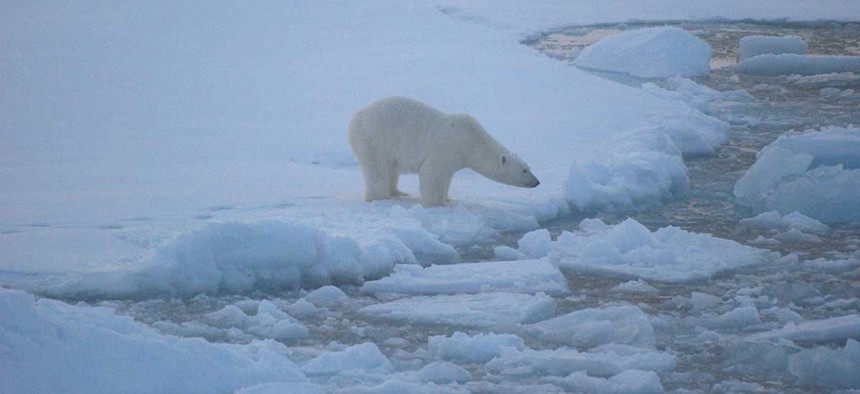
A polar bear stands on sea ice in Alaska's Beaufort Sea in 2010. Dr. Pablo Clemente-Colon/NOAA National Ice Center file photo
NOAA: 2015 Was Hottest Year on Record
As the Obama administration gears up to protect its climate accord, scientists issue a warning.
Global temperatures in 2015 were the warmest since record-keeping began—and it wasn’t even close.
According to new data from the National Oceanic and Atmospheric Administration and NASA, average temperatures over land and ocean were 1.62 degrees Fahrenheit (or 0.9 degrees Celsius) above the 20th-century average, clearing the previous record by 0.29 degrees Fahrenheit. That’s the largest margin by which any annual temperature record has been broken.
In 2015, 10 months set record high temperatures, including December, and the five highest margins of heat for any month all occurred in 2015, according to NOAA’s data.
It follows an alarming trend. Scientists said last year that 2014 was the hottest year on record, and now nine of the 10 hottest years on record have occurred since 2000 (1998 is the sole exception). Sixteen of the last 18 years have been warmer than 1997, which at the time was the hottest on record, and the Earth has set four annual heat records in the last 11 years.
“We’re really looking at a long-term trend, and this is just a symptom of a long-term trend,” said Gavin Schmidt, director of NASA’s Goddard Institute for Space Studies. Following the trend—combined with the effect of the El Niño weather pattern—scientists project that 2016 could top 2015’s record.
The odds of a record-setting 2016? “I’d give you better than evens,” Schmidt said.
El Niño contributed to the spike in this year’s average temperatures, but NASA and NOAA projected that 2015 would have topped records even without it.
)
The news serves to underscore the idea that this could be a pivotal year on climate-change policy. After countries reached a landmark accord to limit the rise in the Earth’s temperatures at the end of last year, the work now turns to implementing—and protecting—the agreement. In the U.S., that largely means fighting off attacks from Republicans in Congress to overturn President Obama’s environmental regulations, notably the carbon-emission limits on power plants.
President Obama even made reference to the heat record—which scientists had been predicting for months—in his State of the Union address last week.
“But even if the planet wasn’t at stake; even if 2014 wasn’t the warmest year on record — until 2015 turned out even hotter — why would we want to pass up the chance for American businesses to produce and sell the energy of the future?” Obama said.
The White House will be working in Obama’s final year to get states on board with the Clean Power Plan (the rule’s initial deadline for states to submit compliance plans is this summer), but it also has plans to roll out more energy-efficiency rules and potential regulations on methane emissions.
Among the impacts of the record heat, scientists said, was the extreme precipitation that made May the wettest month of any on record and caused flooding across the U.S. The scientists also pointed to some anomalies in storm patterns, like the first simultaneous appearance of three storms in the Pacific basin at the end of August, or the late-November appearance of Hurricane Sandra in the Eastern North Pacific ocean, the latest observed appearance since records began in 1971.
The extreme heat also contributed to melting Arctic and Antarctic sea ice.
The global temperature news also comes as the Democrats running for president have vowed to go above and beyond the Obama administration’s climate record.
Republicans, meanwhile, have shown little enthusiasm for any climate action and many front-runners are scornful of any scientific measurement. Sen. Ted Cruz, who leads in some polls in the Iowa caucuses, said on Tuesday that climate change was the “perfect pseudoscientific theory” backed by “big-government politicians,” and he has gleefully cast doubt on climate science.
Cruz and other high-profile climate doubters have pointed to a supposed global-warming “pause” in the years since 1998, but the new data adds more evidence that the slowdown was not indicative of any permanent change.
Thomas Karl, director of NOAA’s National Centers for Environmental Information, said that the latest data showed that warming has continued since that period in line with previous trends, and warned that the world may “see in the future … a change in frequency of extreme weather events” as a result.






